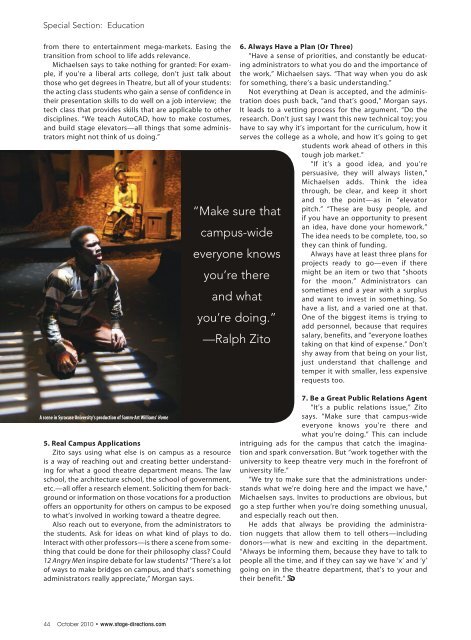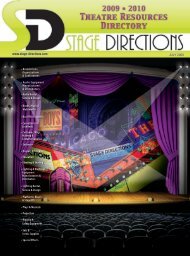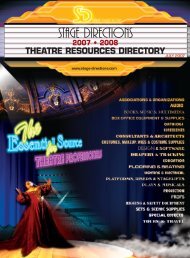Download a PDF - Stage Directions Magazine
Download a PDF - Stage Directions Magazine
Download a PDF - Stage Directions Magazine
You also want an ePaper? Increase the reach of your titles
YUMPU automatically turns print PDFs into web optimized ePapers that Google loves.
Special Section: Education<br />
from there to entertainment mega-markets. Easing the<br />
transition from school to life adds relevance.<br />
Michaelsen says to take nothing for granted: For example,<br />
if you’re a liberal arts college, don’t just talk about<br />
those who get degrees in Theatre, but all of your students:<br />
the acting class students who gain a sense of confidence in<br />
their presentation skills to do well on a job interview; the<br />
tech class that provides skills that are applicable to other<br />
disciplines. “We teach AutoCAD, how to make costumes,<br />
and build stage elevators—all things that some administrators<br />
might not think of us doing.”<br />
6. Always Have a Plan (Or Three)<br />
“Have a sense of priorities, and constantly be educating<br />
administrators to what you do and the importance of<br />
the work,” Michaelsen says. “That way when you do ask<br />
for something, there’s a basic understanding.”<br />
Not everything at Dean is accepted, and the administration<br />
does push back, “and that’s good,” Morgan says.<br />
It leads to a vetting process for the argument. “Do the<br />
research. Don’t just say I want this new technical toy; you<br />
have to say why it’s important for the curriculum, how it<br />
serves the college as a whole, and how it’s going to get<br />
students work ahead of others in this<br />
tough job market.”<br />
“If it’s a good idea, and you’re<br />
persuasive, they will always listen,”<br />
Michaelsen adds. Think the idea<br />
through, be clear, and keep it short<br />
and to the point—as in “elevator<br />
pitch.” “These are busy people, and<br />
if you have an opportunity to present<br />
an idea, have done your homework.”<br />
The idea needs to be complete, too, so<br />
they can think of funding.<br />
Always have at least three plans for<br />
projects ready to go—even if there<br />
might be an item or two that “shoots<br />
for the moon.” Administrators can<br />
sometimes end a year with a surplus<br />
and want to invest in something. So<br />
have a list, and a varied one at that.<br />
One of the biggest items is trying to<br />
add personnel, because that requires<br />
salary, benefits, and “everyone loathes<br />
taking on that kind of expense.” Don’t<br />
shy away from that being on your list,<br />
just understand that challenge and<br />
temper it with smaller, less expensive<br />
requests too.<br />
“Make sure that<br />
campus-wide<br />
everyone knows<br />
you’re there<br />
and what<br />
you’re doing.”<br />
—Ralph Zito<br />
A scene in Syracuse University’s production of Samm-Art Williams’ Home<br />
5. Real Campus Applications<br />
Zito says using what else is on campus as a resource<br />
is a way of reaching out and creating better understanding<br />
for what a good theatre department means. The law<br />
school, the architecture school, the school of government,<br />
etc.—all offer a research element. Soliciting them for background<br />
or information on those vocations for a production<br />
offers an opportunity for others on campus to be exposed<br />
to what’s involved in working toward a theatre degree.<br />
Also reach out to everyone, from the administrators to<br />
the students. Ask for ideas on what kind of plays to do.<br />
Interact with other professors—is there a scene from something<br />
that could be done for their philosophy class? Could<br />
12 Angry Men inspire debate for law students? “There’s a lot<br />
of ways to make bridges on campus, and that’s something<br />
administrators really appreciate,” Morgan says.<br />
7. Be a Great Public Relations Agent<br />
“It’s a public relations issue,” Zito<br />
says. “Make sure that campus-wide<br />
everyone knows you’re there and<br />
what you’re doing.” This can include<br />
intriguing ads for the campus that catch the imagination<br />
and spark conversation. But “work together with the<br />
university to keep theatre very much in the forefront of<br />
university life.”<br />
“We try to make sure that the administrations understands<br />
what we’re doing here and the impact we have,”<br />
Michaelsen says. Invites to productions are obvious, but<br />
go a step further when you’re doing something unusual,<br />
and especially reach out then.<br />
He adds that always be providing the administration<br />
nuggets that allow them to tell others—including<br />
donors—what is new and exciting in the department.<br />
“Always be informing them, because they have to talk to<br />
people all the time, and if they can say we have ‘x’ and ‘y’<br />
going on in the theatre department, that’s to your and<br />
their benefit.”<br />
44 October 2010 • www.stage-directions.com

















